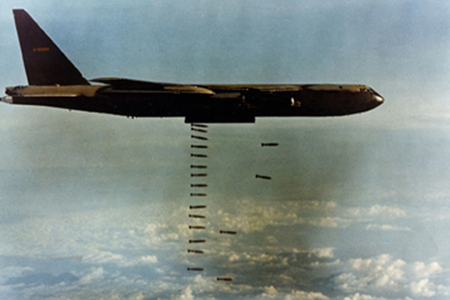
Boeing B-52D Drops Its Bomb Load in Operation Linebacker II,
December 1972. (Photo from
Wikimedia Commons)
if the war ends,
what about wtr?
by Bradford Lyttle
“The U.S. can’t win in Indochina with any ‘reasonable’ investment of conventional forces; decades of violence and political manipulation have produced horrors and corruption that even our most hardened ‘realists’ can’t stomach; public opinion is so overwhelmingly against that particular war that it has become a major political issue that can make or break Presidents; and war induced inflation is ruining our economy.”
There is considerable speculation among people in the peace movement about what will happen to the various peace organizations if the war in Indochina ends. If this speculation flows from the attitude that the war will inevitably end, the American people will have learned their lesson, we will never again attempt foreign imperialistic adventures, and we will have peace forever. The speculation can only harm the movement, for it is unrealistic. It neglects the dominant elements of American society.
Regardless of what happens in Indochina, our society will remain deeply influenced by the military/industrial complex MIC). The war in Indochina will end not because the MIC has vanished but because of certain overriding, unique imperatives created by the war. Some of these are: The U.S. can’t win in Indochina with any ‘reasonable’ investment of conventional forces; decades of violence and political manipulation have produced horrors and corruption that even our most hardened ‘realists’ can’t stomach; public opinion is so overwhelmingly against that particular war that it has become a major political issue that can make or break Presidents; and war induced inflation is ruining our economy.
Indeed so strong is the power of the MIC that even with these compelling reasons for ending the war, getting out of Indochina without precipitating a military right wing coup in this country will be a tremendous accomplishment.
If we do get out, and vital elements of our civil liberties remain, we will still have the MIC to contend with. If speculations about what happens after the end of the Indochina War flow from the realization that the struggle against militarism and exploitation have only begun, then it is realistic. In this context, what is the future of War Tax Resistance?
WTR differed from preceding approaches to tax refusal in that it sought to draw its energy primarily from public revulsion against the Vietnam War. The My Lai poster illustrates this approach. Most war tax resisters are phone tax resisters, and the phone tax was passed to pay for the Vietnam War. Moreover, a number of the more prominent people who have become war tax resisters, such as Mrs. Hart, say in their public statements that they are tax resisters because of the war in Vietnam. To be sure, many tax resisters refuse taxes because of their opposition to all military expenditures, and to the general irresponsibility of the government. It just seems probable that a large percentage of the people on the WTR mailing list refuse taxes because of the Vietnam War.
Therefore, if the war ends, war tax resistance probably will sharply decline.
If this happens, it is important that people deeply involved in war tax resistance don’t lose their morale, give up, and turn entirely to other things. Instead, they should relate war tax resistance to other issues and preserve and strengthen the WTR network.
There will be the issue of military expenditures in general. Secretary of Defense Laird has said explicitly that an end to the war won’t mean reduction of military spending. Nor will the SALT agreements. SALT will accelerate development of certain kinds of nuclear weapons that are enormously expensive, such as Polaris submarines. The next generation of Polaris subs are estimated to cost $1 billion dollars each. One of these submarines alone will be able to destroy a continent. The continuing strategic arms race is ample justification for a vigorous war tax resistance program.
Another issue will be Vietnams in other parts of the world. As long as American society is dominated by irresponsible corporate capitalism, and the military receives virtually all the money it wants—$70 to $100 billion dollars a year—pressures for other adventures like Vietnam will be enormous. There are oil interests to protect in the Near East and Latin America. “Communist penetration” must be stopped in Africa—and so forth. Billions spent for U.S. counter-insurgency programs in Latin America, Africa and the Near East justify War Tax Resistance.
As they oppose the MIC, war tax resisters should continue to relate their movement to other resistance groups and to anti-poverty projects. NARMIC (the AFSC’s National Action/Research on the Military Industrial Complex) and WTR should keep in close touch. Strong bonds should be established with the relatively new groups working for social responsibility and resistance within the scientific and engineering community, such as SESPA (Scientists and Engineers for Social and Political Action) and the Committee for Social Responsibility in Engineering.
The Farm Workers, NWRO [National Welfare Rights Organization] and local anti-poverty projects and movements are natural allies for war tax resisters. As are people in the ecology movement.
If the Vietnam War ends, the work of War Tax Resistance has only begun on an encouraging note. Together with other protest and resistance groups, WTR must create a society in which all forms of government protected and sponsored by inhumanity and social irresponsibility become too costly to continue.
Click here for Printer-Friendly Version
Click here to Return to Historical Gems Page